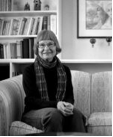Prairieology
Prairie’s the preferred home of the gopher.
He’ll slip into an earthen orifice,
pop up again, alert,
curious,
and, startled by the merest whiff of danger,
once more disappear.
Prairie winds, unhindered,
abscond with topsoil,
hasten tumbleweed along.
Framed by the endless, oceanic sky
meadowlarks warble praise: matins, vespers, laud.
Red-winged blackbirds perch, wind-tousled
sentinels on weathered fence posts.
Clouds drift, round-bellied
fantasies across the firmament.
The horizon’s elusive thread goes on and on,
receding.
Time stands still.
O God of prairie grasses, tumbleweed,
bleached bison bones,
monarch of butterflies, birds, gophers,
and the unbridled wind,
here I stand,
roofless,
miniscule in this flat vastness,
terrified of storm,
crack of thunder,
lightning’s fire-fork.
I’m waiting
for the prairie wind to lose its bluster,
stop howling from the west, breathe gently,
whisper through me. Until then
O God of gophers
sovereign of hiding places,
shelter me.
Rising
So many ways of waking. In summer
a blackbird chorus, four AM, erupts,
light from the east already pouring
on the kitchen floor. Some days
the street crew’s motorized equipment
vrooms through the suburb,
its residents asleep or half awake.
Might be the neighbour’s van
revving for the drive to work.
One day
she called the ambulance
minutes before daybreak. Her husband,
brushing his teeth in the bathroom
had collapsed, the entire day,
her entire life in that one instant
disarranged. Impossible
to imagine
the morning you won’t somehow
wake: birds, radio, the shrill alarm
clock calling the world to order,
signalling the advent
of another day.
Deep Bay Reflection
What I can’t see I don’t know. (Hildegard of Bingen)
Loons on the morning lake
where mist rises like smoke,
a mystery the glassy bay reflects.
Wild asters, clover, goldenrod,
and the whole cool forest keeping watch
while I sleep, through storm
and while the first light warms the sand.
Joggers come, their feet slap-
slapping on the path. I am not alone.
But from where I stand
between tall balsam and a pebbly beach,
I cannot see the bridge they say
came crashing down
in Minneapolis,
into the Mississippi:
the broken span, smashed bodies,
vehicles like crumpled stove pipes.
Nor can I look into the eyes
of Korean hostages still breathing,
still alive, afraid,
feverish in Afghanistan
and still not free.
If I could see them, knowledge
would complicate the morning,
clog comprehension with its weight,
dull the new day’s beauty
with truth too hard for me.
(Deep Bay, August, 2007)
After the fall
That day on Lookout Hill
the bald, slick slope down-slanting from my skis, I bent my knees,
pushed with the poles, took off (the wind like steel) gained speed
and flew. There where the trail veers to avoid an oak and coasts
through a thick grove, I lost control. Waxed skis, poles, limbs
a match-stick tangle, ankle bent beneath the weight of
predicament. Balancing the straight trail to the parking lot
against the winding, longer one mapped out before the fall,
I disentangled stoically, pain flaming in the strained ankle.
Clutching my pre-fall plan I pressed toward the finish, limping.
The verdict at Emergency: ‘not fractured.’ (But damaged
ligaments swell up and hurt like hell.)
Today, remembering the fall,
I choose uncomplicated trails. Snow lodges—tufts of cotton candy—
on bare branches of birch. On stump and rock. The sewing-machine-
stitch spoor of pocket mice appears and disappears in white powder.
A deer’s meticulous, heart-shaped footprints intersect the trail.
Gliding at modest speed I yield to foolish fantasies: I’m poised
once more on Lookout Hill, knees bent, head filled with burning
hope. Like Leonardo on Swan Mountain, prototypes of aircraft
etched in his brain. Or Icarus at lift-off: fuelled by desire
that hurls him to the sky. His pulsing fingertips reach out to touch
the fiery sun. It sends him spinning--burnt out, ashen asteroid--
down to earth.
Bird
The bird in that balsam
backlit by evening sky
is a flat black silhouette
that sings to me
its only song.
It flits like a shifting
shadow, branch to branch.
I want to know its colour
and its name, but I’m afraid
a shadow has neither
and the light that makes the bird appear
black, blinds me. How long
will it keep repeating
that song? I think it means
to lift my spirits
lure me from my place on the beach,
reading or simply lost
in thought.
Come, it says, and be airborne.
Be lit by the evening sky’s last light.
Sing lustily and fly
free. Cast off your need
to lift the burdens of tomorrow
today.
On poverty
Blessed are you who are poor
For yours is the kingdom of God. (Luke 6:20)
Let’s do an inventory of the poor. The garrulous
man next door lost his job and his sullen teen-
aged daughter denied braces, the steadily
humming fridge empty and the rent not paid.
Mrs. B who inhabits that ostentatious multi-level
with her cute poodle and her usual run of bad luck
at the casino is poor too, she claims. And let’s
include that new family, that so disgraceful
rust bucket rattling daily down our street, they
can’t be rich. You get the picture. The poor
are everywhere. We have them with us
in abundance and the sun shines, rain falls
equally on each, as on the rich who are not
promised kingdoms but are sent empty away.
And look we haven’t even got beyond
the poor we know and like
to dislike.
Shall we continue with the distant destitute
whose dearth is brought about by war, by
corporate greed or government mismanagement?
Whose anguish, mercifully, we can’t see or hear.
Or should we stop while there is time
to stop and catch our breath and fall
to our knees, indeed, upon our faces,
begging forgiveness? Pleading
empty-handed
for a portion of the bread
of mercy.
